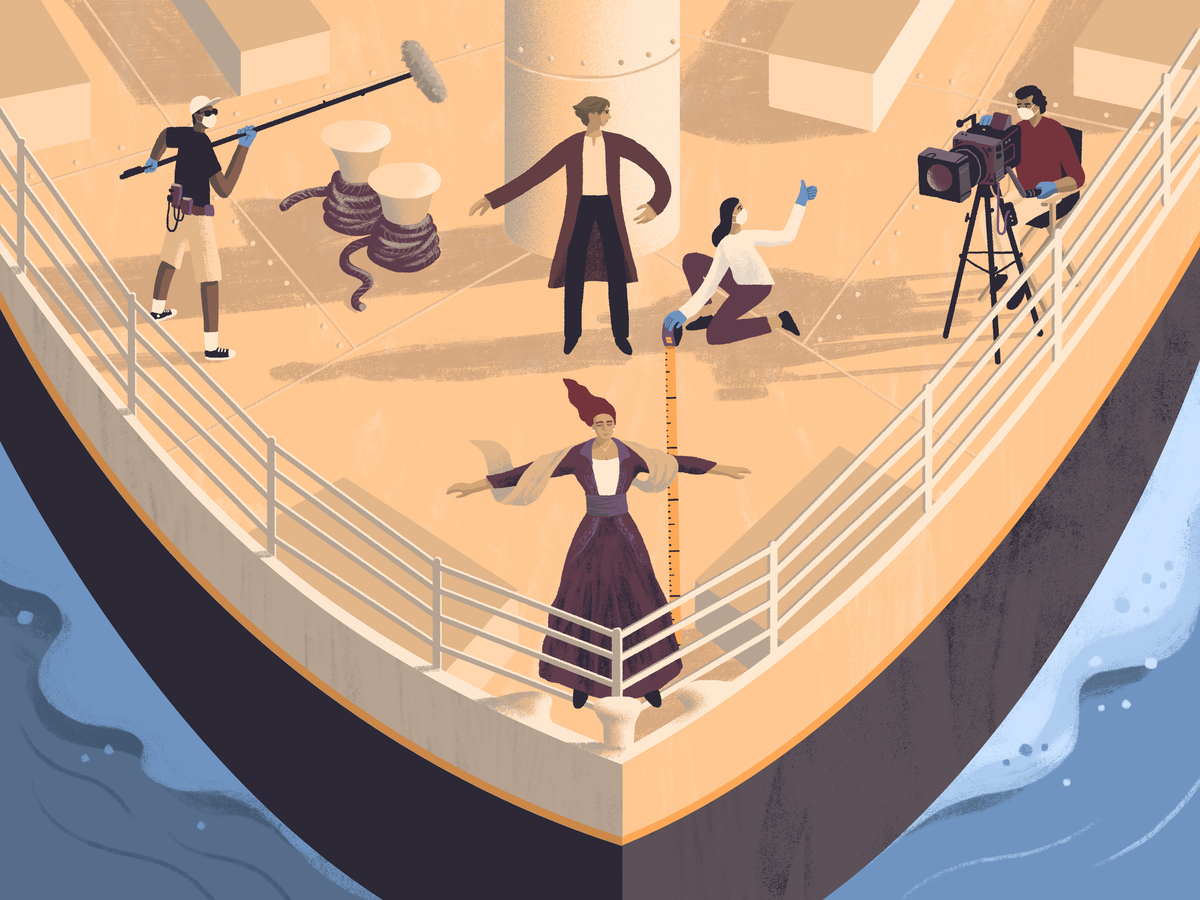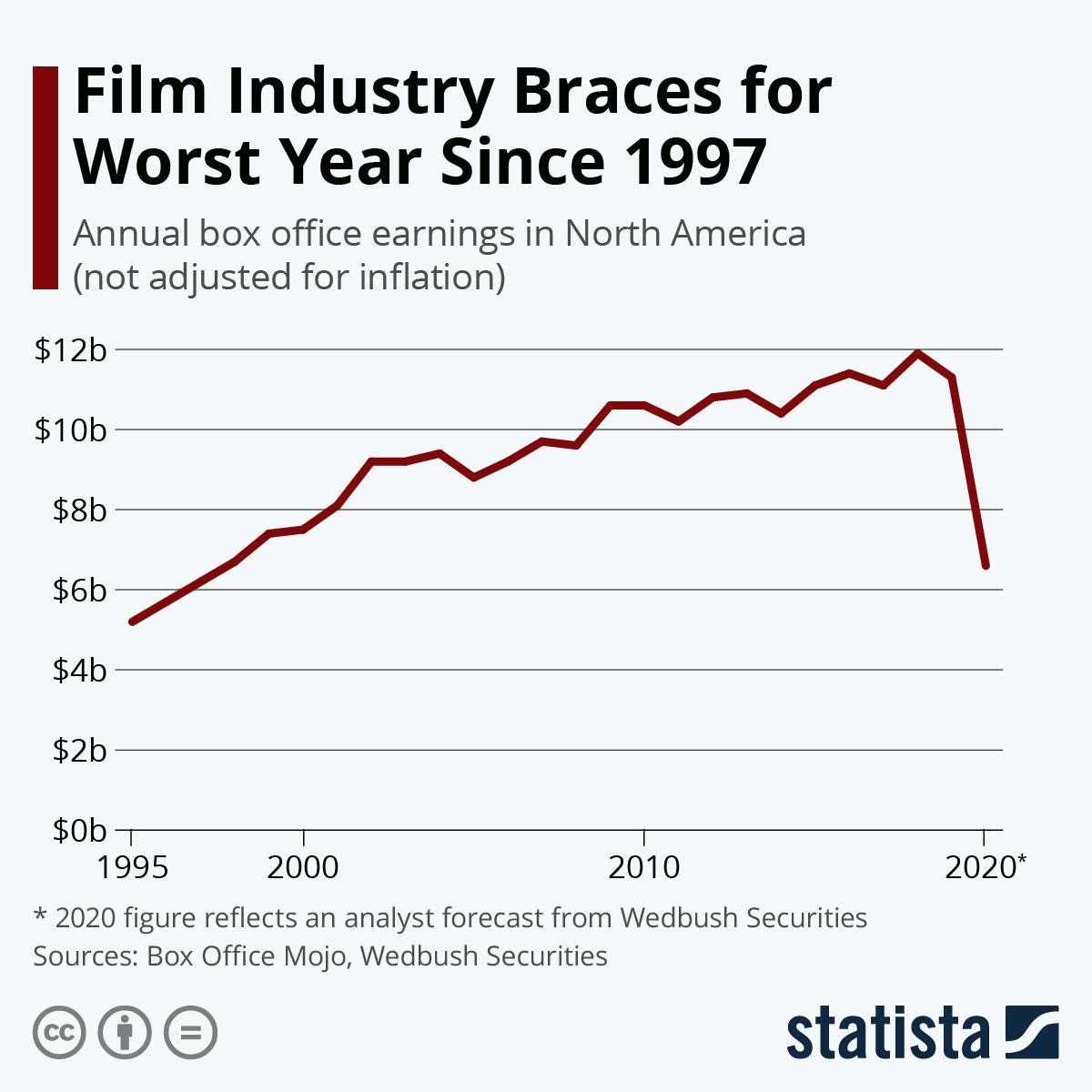By: Meghan Pettay
A New Reality
 Since the massive outbreak of COVID-19 has begun, the government has recommended citizens to stay at home, not leaving much room for every day people to be entertained. Without the ability for people to leave their homes and experience of personal interaction, many have turned to the escape of the internet. In particular, movies and tv viewership has skyrocketed in isolation. Streaming services have benefited greatly because of this, with thousands of new subscribers since COVID-19 began. This being said however, the film industry as a whole has taken a huge loss during this time. Theatres have completely shut down due to health and safety reasons, causing filmmakers to question if making and distributing a film would even be profitable now. Although it pales in comparison to the threat of human life, many in the entertainment industry have lost their careers because of the virus. Not only have cinemas received little to no money, but it is likely to damage the industry for the foreseeable future. All filming in places such as Hollywood has been halted. There is now a delay in the distribution of box office hits due to the lack of confidence in the film industry's ability to bounce back. It's questionable if the industry will ever return to the glory and financial gain it once had, lowering the quality of films in the market today. This will change media as we know it, which is incredibly worrying for the future of film.
Since the massive outbreak of COVID-19 has begun, the government has recommended citizens to stay at home, not leaving much room for every day people to be entertained. Without the ability for people to leave their homes and experience of personal interaction, many have turned to the escape of the internet. In particular, movies and tv viewership has skyrocketed in isolation. Streaming services have benefited greatly because of this, with thousands of new subscribers since COVID-19 began. This being said however, the film industry as a whole has taken a huge loss during this time. Theatres have completely shut down due to health and safety reasons, causing filmmakers to question if making and distributing a film would even be profitable now. Although it pales in comparison to the threat of human life, many in the entertainment industry have lost their careers because of the virus. Not only have cinemas received little to no money, but it is likely to damage the industry for the foreseeable future. All filming in places such as Hollywood has been halted. There is now a delay in the distribution of box office hits due to the lack of confidence in the film industry's ability to bounce back. It's questionable if the industry will ever return to the glory and financial gain it once had, lowering the quality of films in the market today. This will change media as we know it, which is incredibly worrying for the future of film.
The Movie Industry is Changing
 Major films such as Marvel’s Black Widow, Top Gun, Disney’s Mulan and James Bond were all delayed to July 2021 at the earliest. But these dates are never certain, due to the limited understanding of the virus. A french media conglomerate called Vivendi surveyed a wide group of people, where 97% of those questioned having changed their entertainment habits since lockdown began. 1997 was once the worst year in profit for the film industry, but 2020 has now taken that title. An estimation revealed that the revenue loss due to the decrease in underlying movie demand is approximately 52 million dollars nationwide (Kim, 2020). This was only during the first five weeks after the outbreak, implying a 34 percent decrease in sales. These results also suggest an additional 42 million dollars were lost as the delay in films rose. Even Disney has shut down production on live-action projects, closing all production until further notice. Although this is certainly upsetting, it is possibly the best course of action to ensure social distancing is kept safe.
Major films such as Marvel’s Black Widow, Top Gun, Disney’s Mulan and James Bond were all delayed to July 2021 at the earliest. But these dates are never certain, due to the limited understanding of the virus. A french media conglomerate called Vivendi surveyed a wide group of people, where 97% of those questioned having changed their entertainment habits since lockdown began. 1997 was once the worst year in profit for the film industry, but 2020 has now taken that title. An estimation revealed that the revenue loss due to the decrease in underlying movie demand is approximately 52 million dollars nationwide (Kim, 2020). This was only during the first five weeks after the outbreak, implying a 34 percent decrease in sales. These results also suggest an additional 42 million dollars were lost as the delay in films rose. Even Disney has shut down production on live-action projects, closing all production until further notice. Although this is certainly upsetting, it is possibly the best course of action to ensure social distancing is kept safe.
Adapting to Our New Life
 An important aspect to note in this issue is that the theatre industry did not at all try to entice people into coming into theatres to boost revenue. Cinemas could have decreased prices to see films due to the lack of people purchasing tickets. The average Netflix subscription is about 13.99 a month, where you can be paying up to 12- 15 dollars for a movie ticket, yet there is no clear evidence that the price decreased in the beginning of the pandemic (Moon, 2020). With the necessity of social distancing and isolation, it all seems like the easiest choice to make. With endless movies and tv shows to watch from home with the click of a button, there seems to be no real reason to attend the cinema. Re-watching Friends or The Office for the 10th time will always seem to win now over risking your safety to sit in a theatre and watch a new movie. With the constant worry of sanitization, how could anyone feel safe in a theatre filled with people like it once was? Seems impossible to comprehend nowadays.
An important aspect to note in this issue is that the theatre industry did not at all try to entice people into coming into theatres to boost revenue. Cinemas could have decreased prices to see films due to the lack of people purchasing tickets. The average Netflix subscription is about 13.99 a month, where you can be paying up to 12- 15 dollars for a movie ticket, yet there is no clear evidence that the price decreased in the beginning of the pandemic (Moon, 2020). With the necessity of social distancing and isolation, it all seems like the easiest choice to make. With endless movies and tv shows to watch from home with the click of a button, there seems to be no real reason to attend the cinema. Re-watching Friends or The Office for the 10th time will always seem to win now over risking your safety to sit in a theatre and watch a new movie. With the constant worry of sanitization, how could anyone feel safe in a theatre filled with people like it once was? Seems impossible to comprehend nowadays.
Remaining at home makes way for very little ways to consume time. Kids are not attending school like they normally would before, and many adults now work at home. Social media and entertainment services are an easy fix for this issue. Netflix can even be used as a way to interact with loved ones, due to apps such as “Netflix parties” to get people to watch movies together from a distance (2020,Ayanbadejo) . These acts subsequently destroy a lot of the cinemas' once positive aspects, since you do not need to leave the comfort of your home to watch a movie with your friends. Innovation that comes from this has allowed streaming services to skyrocket in an almost unbelievable way. For example, Disney+, had over 10 million subscribers within the first day of the site launching. This is an unspeakable amount of revenue being brought in by a streaming service. Within the first few months, that number was raised to around 50 million. So it begs the obvious question, are movie theatres even worth it anymore? It is very hard to find a compelling argument to save the theatre industry, with so many people now preferring streaming services.
The Future of Film
 Out of 10,000 people Surveyed by the journal of Medical Internet research, 60 percent stated that their go to source of entertainment was given to them by Netflix or other streaming services (such as Disney +). It is stated that stressors cause the youth of today to find a fast and easy outlet to forget about the stresses and ongoing changes to our daily lives. This is all of course, due to COVID-19. The second source of entertainment was exercise, while the third was print media (Khalili-Mahani, 2020). This means that attending the movie theatre was not even close to being high on the list. This is because many people don't even consider it to be a plausible activity to participate in anymore. Especially if there are much safer and cheaper ways to spend your time.
Out of 10,000 people Surveyed by the journal of Medical Internet research, 60 percent stated that their go to source of entertainment was given to them by Netflix or other streaming services (such as Disney +). It is stated that stressors cause the youth of today to find a fast and easy outlet to forget about the stresses and ongoing changes to our daily lives. This is all of course, due to COVID-19. The second source of entertainment was exercise, while the third was print media (Khalili-Mahani, 2020). This means that attending the movie theatre was not even close to being high on the list. This is because many people don't even consider it to be a plausible activity to participate in anymore. Especially if there are much safer and cheaper ways to spend your time.
In less than a year, life truly has changed as we once knew it. A life where we hug and kiss friends we see on the street is no longer a reality, and the film industry is suffering from all this change. With a steadily evolving world, it is possible that theatres will become an activity of the past. But, what this all means for the film industry as a whole is still unknown. Film has never truly existed without cinemas before, so its survivability as a whole is questionable. With the constant delay of films this year, it seems like Hollywood is not yet ready to evolve into a new world. Clearly there is much money to be made within streaming services, but making streaming platforms a main source of film just seems like the next step in the future. However, it's truly difficult to tell. Maybe one day life will go back to the way it was before the catastrophe of 2020, and theatres will again become a regular occurrence. For now, all we can do is wonder, and watch Schitt's Creek again on Netflix while doing it.
Bibliography
Moon, Sarah. Effects of COVID-19 on the Entertainment Industry. Chandigarh: Idosr Journal of Experimental Sciences. 2020 https://www.idosr.org/wp-content/uploads/2020/04/IDOSR-JES-51-8-12-2020.-P2.pdf
Ayanbadejo, Mayowa. How has Coronavirus Impacted the Evolution of Cinemas? England: University of Oxford. 2020 https://www.pmb.ox.ac.uk/sites/default/files/em_student_project_tt20.docx.pdf#page=6
Kim, In. The Impact of Social Distancing on Box-Office Revenue: Evidence from the COVID-19 Pandemic. Kazakhstan: Nazarbayev University. 2020 https://papers.ssrn.com/sol3/papers.cfm?abstract_id=3578822
Khalili-Mahani, Najmeh. Pahayahay, Amber. The Impact of Social Distancing on Box-Office Revenue: Evidence from the COVID-19 Pandemic. Montreal: Concordia University. 2020 https://www.jmir.org/2020/8/e20186/

